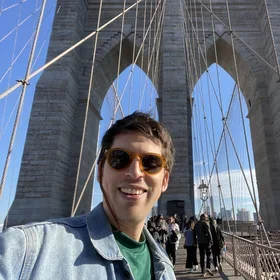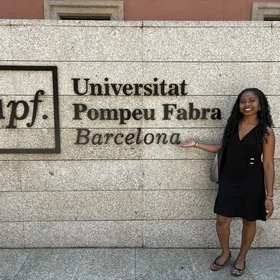By Nia Anyike, ’22SPS, Strategic Communication
Students Mona A. and Jeanna Siugin Lui are leading parallel academic and work lives. They’re not only in the Columbia M.P.S. in Wealth Management program—they both have jobs in family offices.
Mona is an investment manager at a family office in Saudi Arabia. Her role: sourcing, evaluating, and planning portfolio investments and allocations locally and globally. Jeanna serves as a Chief Financial Officer and Senior Advisor at a New York City-based family office. She oversees financial reporting, tax compliance, and accounting matters for the principals and their family-related accounts.
How is Columbia enhancing their professional lives? They recently spoke with student writer Nia Anyike to explain.
What inspired you to pursue a master’s in Wealth Management? How is your Columbia education helping you to add value in the context of a family office?
Mona: I like to see myself as a lifelong learner. After completing my CFA, I focused on learning about specific topics of interest, rather than broader business courses. I consider my investment background pretty strong, but I needed to complement my knowledge with an application that combines wealth management and investments as this would give me an edge in my current role and plans. The education journey at Columbia has been great and different so far. The amount of student engagement and live applications are beyond valuable to me. I believe the experience and knowledge I will gain from the courses and connecting with the best industry practitioners will add significant value to myself—and my family office.
Jeanna: Although I have worked and grown professionally in the family office space (both Multi-Family Office (MFO) and Single Family Office (SFO)) for many years, I feel there are still things I can learn from an academic perspective that can help enhance my career and provide deeper insights into how to better serve our clients. I believe a master’s degree in Wealth Management from Columbia will help broaden my outlook—and understanding of what financial professionals in other wealth management platforms, including other family offices, do in terms of their services, technology, and execution. Also, being able to make new connections with like-minded people who share the passion for providing the highest level of financial services while working toward an Ivy League degree is just the cherry on top!
Which classes are you taking this semester? What are your impressions so far?
Mona: I am currently taking The Wealth Management Landscape, taught by Bill Woodson (Lecturer and Head of Strategic Wealth Advisory and Family Enterprise Services, Silicon Valley Bank), and Foundations of Wealth Management, taught by Christina Lynn (Lecturer and Wealth Management Consultant). Both courses are intense and offer an excellent level of knowledge. It was a steep learning curve for me and the rest of the cohort when we first started. As I got the hang of deadlines and understood the requirements of each course, I started enjoying the process. I am naturally curious and ask many questions, and both Professors Woodson and Lynn have been extremely supportive in answering all my queries.
Jeanna: I am taking The Wealth Management Landscape with Bill Woodson (who is the co-author of the book The Family Office). I enjoyed reading his book and highly recommend it to anyone interested in understanding the intricacies of how a family office operates. I am also taking Foundations of Wealth Management with Christina Lynn. I think this class is a crucial introduction to the program as it gives us the basic foundation upon which future classes will build. Although I am already a CFP certificant, this class has been a very good refresher on the subject matters a financial planner should master.
You’ve been in the program for a few months now. What’s something you’re doing differently at work as a result of what you’re learning?
Mona: I feel like I have learned a lot already. I am learning new things every day from the courses, the faculty, and my classmates. One thing that I do differently now is how I define my team's roles with the help of some fine-tuning that Bill Woodson provided us. Having the privilege to learn from a leader in the family office industry has been invaluable and I am grateful for having this opportunity.
Jeanna: One thing I have noticed that I do differently since school started is to constantly ask myself whether what we are doing is indeed the most effective way of accomplishing a task—particularly when it comes to technology. I also love learning the term servant leadership and what it means in the context of working in a family office. (Servant leadership is defined as a leadership philosophy in which the goal of the leader is to serve). That’s because advisors in family offices often find themselves practicing that. So it is helpful to be more mindful of that dynamic.
Tell me about the in-person residency at the start of the program.
Jeanna: I think the residency is critical for every new student coming into this program. Without it, it would have been very challenging for me to figure out Canvas (the Learning Management System used by Columbia University) and the structure of the classes and assignments on day one. It was also very nice to meet my classmates in person and have a chance to get to know them. This is particularly important since the program is primarily remote. Meeting the students from the previous cohort was also reassuring. Having a chance to talk to them and listen to their experiences—and their tips—was very helpful!
Mona: The residency was a great experience, and I was grateful we had the chance to experience it at the start of the program. Spending three days with new people helps you to get to know them, understand their different personalities, and break many of the formalities that naturally come with online programs. Additionally, I was glad I connected with the interim program director, Tracy Schwartz, and the rest of the faculty in person. Meeting them beforehand enhanced our experience when taking their courses online.
What has most surprised you about Columbia so far?
Mona: Columbia was always known to me for its valuable leadership opportunities and unparalleled student life. That’s been even more so since I joined. The Career Design Lab has been doing a great job keeping students engaged weekly and during our residency. The activities and events hosted by the Office of Student Life are tremendous and make me want to move to New York! As for networking, I joined several student clubs that have expanded my network. Additionally, having the opportunity to study with an amazing cohort greatly expanded my network in different industries—and countries.
Jeanna: I am still learning how to navigate all the resources the school has to offer. One thing I enjoy tremendously is being at the beautiful campus and feeling the energetic atmosphere.
How are you balancing virtual learning with your other commitments?
Mona: I have strong time management skills that I have maxed out since the program's start. The load of work is not easy and requires students to stay on top of their tasks to keep up with the lectures, readings, discussions, and submissions. My family understands the commitment that I made once I enrolled in the program and have been supportive. I try to stay away from schoolwork for a few hours to spend time with the family, especially during weekends. As for work, I don’t bring in schoolwork to the office to make sure that I don’t compromise the quality of my work.
Jeanna: Although virtual learning has been an effective teaching platform so far, it cannot replace the full experience of live classroom learning. In our case, the asynchronous class gives us flexibility, but the related reading and assignments have been very intense. The pace is fast and the overall program so far has been quite rigorous and demanding. So far it has been quite challenging balancing school, work, and family responsibilities. We were told the first semester is the hardest. I am hoping that is the case and that the pace and rhythm stabilize as we move into the second semester.
What advice would you give future students in the program?
Mona: As of now, all I can say is that the number one skill you need in the program is time management. The second most important thing to understand is that a good portion of your work depends on group work. So you will have to be flexible and understand that everyone is equally busy. Lastly, a student from a previous cohort said this to us and I keep repeating it: you will get what you give in this program.
Jeanna: One piece of advice I can offer to future students considering this particular program is to make sure they have a strong support system and flexibility from work because it is fast-tracked and very intense. They will need to be 100% committed and have the time carved out to focus on schoolwork to be able to fully emerge in the experience and get the most out of it. Therefore, their social life and time spent in other areas of their lives may suffer during the next sixteen months. In my opinion, that is a small sacrifice for what we will get in return!


